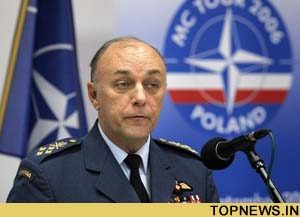Amidst controversy, France returns to NATO military command
 Paris - When France is officially welcomed back to NATO's military command structure at the group's April 3-4 summit, it will restore what French President Nicolas Sarkozy suggested was normalcy to the country's relationship with the transatlantic alliance.
Paris - When France is officially welcomed back to NATO's military command structure at the group's April 3-4 summit, it will restore what French President Nicolas Sarkozy suggested was normalcy to the country's relationship with the transatlantic alliance.
The French president linked parliamentary approval of his decision to return Paris to full NATO membership to a vote of confidence in the government's entire foreign policy, a tactic that irritated even members of his own centre-right UMP party.
"We're condemned to vote for it," UMP deputy Georges Tron told the daily Le Parisien. "The executive is telling us: Push the nuclear button or shut up."
That Sarkozy felt compelled to resort to a slick ploy to get parliamentary approval of the move speaks volumes about how tricky that relationship still is, 43 years after Charles de Gaulle pulled France out of the NATO's military command and kicked US bases off French territory.
The reason for the manoeuvre was that a substantial number of UMP members are die-hard Gaullists and still adhere to the late general's Cold War view that France should be an independent bridge between East and West.
Nevertheless, 10 UMP law-makers abstained from the vote and one voted against it.
In addition, left-wing and centrist opponents to France's return to full NATO membership argued that it placed Paris under the pernicious influence of Washington and made it a servant to its geopolitical aims.
France, they argued, would not have been able to oppose former US president George W Bush's war in Iraq if it had been fully integrated in 2003.
This argument seemed particularly powerful in light of US President Barack Obama's stated goals in Afghanistan, where France currently has some 2,800 soldiers deployed as part of a NATO force.
Sarkozy's critics suggested that Paris would be unable to say no if Obama wanted to expand what the new French envoy to Kabul, Pierre Lellouche, said was a war.
However, according to Etienne de Durand, director of security studies at the French Institute for International Relations (IFRI), the argument over Afghanistan was "a wrongheaded debate that had nothing to do with reality."
In today's NATO, "you can always say no," Durand said. "This is no longer the NATO of the Cold War. It is no longer a chain of command, but integrated headquarters, which is not the same thing at all."
NATO today "is just a bureaucracy, just administrative; it doesn't have troops," he said. "Troops are contributed on a voluntary basis by nation states."
However, he admitted that the situation in Afghanistan was "a mess" and that there would certainly be many more casualties, including among the French.
"It's going to be bloody in the next few years," Durand warned, noting that the effect of casualties on public opinion would depend on how the issue was handled by the government.
Asked if the French return to full NATO membership was a positive step, he hesitated.
"There is no clear-cut answer to that. The prior situation was quite comfortable ... Nobody was asking us to get back, and there was no urgency in getting back," Durand said.
But Sarkozy wanted to put an end to the "French exception" in relation to NATO and he wanted to show other governments that France was "serious about the ESDP (European Security and Defence Policy)."
The French president also wanted to show that a serious European defence policy was "not a means to torpedo NATO," Durand said.
In addition, France's return to the alliance could signify a kind of revitalization of NATO, particularly if, as media reports suggest, Paris is given command of the Allied Command Transformation (ACT) in Norfolk, Virginia.
Among other missions, the Allied Command Transformation provides the conceptual framework for the conduct of future Alliance operations and works to improve relationships with nations and international organizations.
"That would be a good place for France to make some real contributions and add dynamism to NATO," Durand said. (dpa)